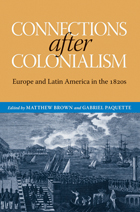2 books about Sexton, Jay

Connections after Colonialism
Europe and Latin America in the 1820s
Edited by Mathew Brown and Gabriel Pacquette
University of Alabama Press, 2013
Contributing to the historiography of transnational and global transmission of ideas, Connections after Colonialism examines relations between Europe and Latin America during the tumultuous 1820s.
In the Atlantic World, the 1820s was a decade marked by the rupture of colonial relations, the independence of Latin America, and the ever-widening chasm between the Old World and the New. Connections after Colonialism, edited by Matthew Brown and Gabriel Paquette, builds upon recent advances in the history of colonialism and imperialism by studying former colonies and metropoles through the same analytical lens, as part of an attempt to understand the complex connections—political, economic, intellectual, and cultural—between Europe and Latin America that survived the demise of empire.
Historians are increasingly aware of the persistence of robust links between Europe and the new Latin American nations. This book focuses on connections both during the events culminating with independence and in subsequent years, a period strangely neglected in European and Latin American scholarship. Bringing together distinguished historians of both Europe and America, the volume reveals a new cast of characters and relationships ranging from unrepentant American monarchists, compromise seeking liberals in Lisbon and Madrid who envisioned transatlantic federations, and British merchants in the River Plate who saw opportunity where others saw risk to public moralists whose audiences spanned from Paris to Santiago de Chile and plantation owners in eastern Cuba who feared that slave rebellions elsewhere in the Caribbean would spread to their island.
Contributors
Matthew Brown / Will Fowler / Josep M.
Fradera / Carrie Gibson / Brian Hamnett /
Maurizio Isabella / Iona Macintyre / Scarlett
O’Phelan Godoy / Gabriel Paquette / David
Rock / Christopher Schmidt-Nowara / Jay
Sexton / Reuben Zahler
Matthew Brown / Will Fowler / Josep M.
Fradera / Carrie Gibson / Brian Hamnett /
Maurizio Isabella / Iona Macintyre / Scarlett
O’Phelan Godoy / Gabriel Paquette / David
Rock / Christopher Schmidt-Nowara / Jay
Sexton / Reuben Zahler
[more]

Crossing Empires
Taking U.S. History into Transimperial Terrain
Kristin L. Hoganson and Jay Sexton, editors
Duke University Press, 2020
Weaving U.S. history into the larger fabric of world history, the contributors to Crossing Empires de-exceptionalize the American empire, placing it in a global transimperial context. They draw attention to the breadth of U.S. entanglements with other empires to illuminate the scope and nature of American global power as it reached from the Bering Sea to Australia and East Africa to the Caribbean. With case studies ranging from the 1830s to the late twentieth century, the contributors address topics including diplomacy, governance, anticolonialism, labor, immigration, medicine, religion, and race. Their transimperial approach—whether exemplified in examinations of U.S. steel corporations partnering with British imperialists to build the Ugandan railway or the U.S. reliance on other empires in its governance of the Philippines—transcends histories of interimperial rivalries and conflicts. In so doing, the contributors illuminate the power dynamics of seemingly transnational histories and the imperial origins of contemporary globality.
Contributors. Ikuko Asaka, Oliver Charbonneau, Genevieve Clutario, Anne L. Foster, Julian Go, Michel Gobat, Julie Greene, Kristin L. Hoganson, Margaret D. Jacobs, Moon-Ho Jung, Marc-William Palen, Nicole M. Phelps, Jay Sexton, John Soluri, Stephen Tuffnell
Contributors. Ikuko Asaka, Oliver Charbonneau, Genevieve Clutario, Anne L. Foster, Julian Go, Michel Gobat, Julie Greene, Kristin L. Hoganson, Margaret D. Jacobs, Moon-Ho Jung, Marc-William Palen, Nicole M. Phelps, Jay Sexton, John Soluri, Stephen Tuffnell
[more]
READERS
Browse our collection.
PUBLISHERS
See BiblioVault's publisher services.
STUDENT SERVICES
Files for college accessibility offices.
UChicago Accessibility Resources
home | accessibility | search | about | contact us
BiblioVault ® 2001 - 2024
The University of Chicago Press









